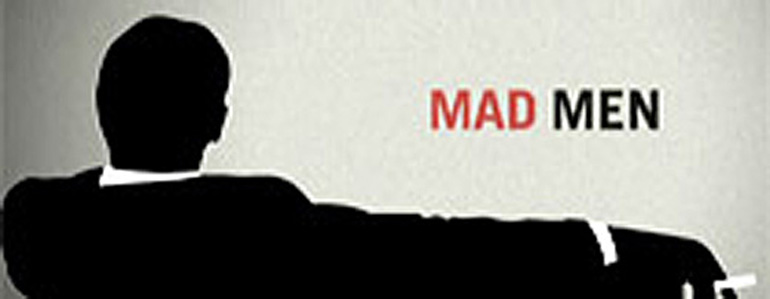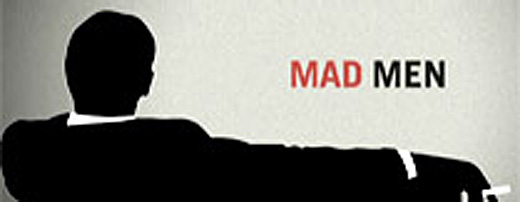Mad Men Note:
Contra Mendelsohn
Wednesday, February 9th, 2011
David Mendelsohn launches his fond disparagement of Mad Men as an odious comparison to such shows as The Wire, The Sopranos, and Friday Night Lights.Â
With these standouts (and there are many more), Mad Men shares virtually no significant qualities except its design. The writing is extremely weak, the plotting haphazard and often preposterous, the characterizations shallow and sometimes incoherent; its attitude toward the past is glib and its self-positioning in the present is unattractively smug; the acting is, almost without exception, bland and sometimes amateurish.
Once you’ve read this, you know that Jon Hamm is going to get hammered; the only question is, how soon. Mendelsohn takes his time: the bomb drops toward the end of his essay’s second section.Â
The acting itself is remarkably vacant, for the most part—none more so than the performance of Jon Hamm as Don. There is a long tradition of American actors who excel at suggesting the unconventional and sometimes unpleasant currents coursing beneath their appealing all-American looks: James Stewart was one, Matt Damon is another now. By contrast, you sometimes have the impression that Hamm was hired because he looks like the guy in the old Arrow Shirt ads: a foursquare, square-jawed fellow whose tormented interior we are constantly told about but never really feel. With rare exceptions (notably Robert Morse in an amusing cameo as the eccentric Japanophile partner Bert Cooper), the actors in this show are “acting the atmosphere,†as directors like to say: they’re playing “Sixties people,†rather than inhabiting this or that character, making him or her specific. A lot of Mad Men is like that.
I haven’t seen either The Wire or Friday Night Lights, and, on the basis of the few episodes that I watched, I found the world of The Sopranos to be distasteful — distasteful for the very reason why I’ve enjoyed Mad Men. Mad Men comes closer than any show that I’ve seen to portraying the world that I grew up in. I like to think that I’ve outgrown that world, but there are things about it that I haven’t put behind me, and one of them is a sniffy disdain for Italian-Americans with dodgy connections who live in New Jersey or on Long Island. I’ll watch a good movie about mobsters — Goodfellas has been a fave since the first time I saw it — but two hours is enough; I can’t take an interest in those people that brings me to the television set week after week. In short, I’m in no position to argue with Mendelsohn about the comparative merits of other TV shows. I have a hard enough time watching Mad Men, because it really is the only television that I watch (aside from not-enough TV5, the French-language channel), and I’m not in the habit of showing up for something on time in my own home.Â
I do watch Mad Men, though, but not for the interesting reasons that Mendelsohn proposes. In his view, the popularity of Mad Men reflects the grave curiosity of the children in the show, whose real-world counterparts have grown up to form the bulk of its audience. As one of the oldest baby boomers, I’m a bit older than that; I started working at a summer job on Wall Street in 1964, a period that lay in the future when Mad Men began but that has since been left behind. And I’m here to tell you that Mad Men captures not only what that world looked like, but what it felt like as well. And what it felt like was a zizzing nothing, an anxious emptiness.
I watch Mad Men because it makes me feel lucky: I outlived that barren time! Although I disagree with Daniel Mendelsohn’s conclusions about the quality of Mad Men, I agree with many of his observations, only I apply them the United States of 1960, not to Matthew Weiner’s “soap opera.” “Remarkably vacant” is how I would describe the lives of the adults I saw in our prosperous Westchester suburb. We inhabited an atmosphere of phoney optimism that was sustained by overlooking and forgetting the facts of life. It was a time of deliberate inattentiveness to anything beyond the fetishistic palette of appearances, and oblivion about the past. People make silly exaggerated claims about the impact of the Internet on daily life now, but the late Fifties and early Sixties were ensorcelled by a pious devotion to the idea that baroque automobiles and domestic appliances would regenerate human nature.Â
Mendelsohn speaks admiringly of the “darkly glinting, almost Aeschylean moral textures” of The Wire and The Sopranos. I can’t imagine anything that would be more out of place in a show about the advertising executives of fifty years ago than tragic necessity. He complains about the inconsequence of many of the narrative threads. I recall a period when just about the only dependable causal relationship was the one between showing up at work and getting paid. Everything else was variable: sometimes interesting but mostly boring — boring and small. You can recreate this world by following a jiffy recipe from one of the period’s many breezy cookbooks: you will wonder why you took the trouble to produce a dish with so little flavor. Insipid edibles were made appealing by exotic serving vessels — fondue pots, clever platters and bowls for dips for Jell-O salads, and outdoor grills. (That these are all still with us doesn’t mean that we need them as we used to do.) The world was painted in saturated pastels that spoke of summer on Mars. Grown men and women talked about nothing: golf and bridge and vacation and novelty. Earnestness of any kind was shunned: the ideal was a “fun” person, someone with a macaroni backbone. The adults of the Western World had annihilated themselves in the final paroxysm of the French Revolution, and seniority devolved upon adolescent postwar Americans who mistook their zealous careerism for maturity. (Even motherhood was a career.)Â
I watch Mad Men with the satisfaction that you might feel passing by the marked grave of serial murderer who claimed a victim from your family: I like being sure that it’s really dead. And I mean it literally when I say that Jon Hamm’s impersonation of Don Draper is divine: he not only looks like a god but his eyes crinkle with the pained wisdom of Wotan: alone of his tribe, he knows that not even gods are immortal. He has the grace to avoid the tragic implications of his role; fretting would be bad style. He is a resistance fighter without a cause, a man doing his best to find interest in a wilfully uninteresting world. Jon Hamm is just about perfect as the existentialist hero of an alienated time. I like to think, for his sake, that he’s acting.



